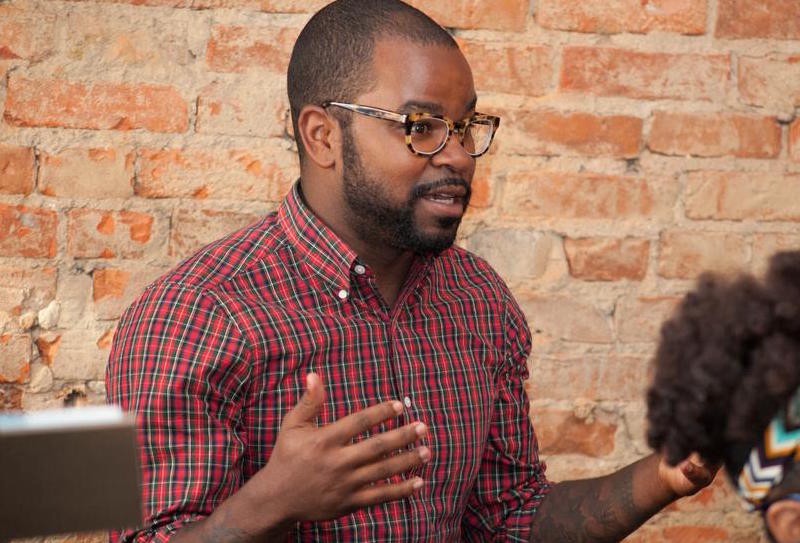New Revivalists is a series from ImpactAlpha and Village Capital profiling the people, places and policies reviving entrepreneurship — and the American Dream.
New Revivalist: Derrick Braziel, co-founder and managing director of MORTAR, a business accelerator for local entrepreneurs of color.
Place: Cincinnati, Ohio
Mission: “We started MORTAR to connect people with ideas to resources, to create pathways to wealth and to pass that wealth on to future generations.”
Follow: @DerrickBraziel
Derrick Braziel is on a mission to change the way we identify, resource, and support underrepresented entrepreneurs, locally and nationally. He co-founded MORTAR in 2014 (with William Thomas and Allen Woods) to connect Cincinnati entrepreneurs of color to 21st-century resources. An African American-led business, MORTAR’s empirical methods for helping entrepreneurs break barriers represents a local model with nationwide potential.
ImpactAlpha: What is the origin of your work?
Braziel: I’ve always been interested and passionate about the culture of poverty — causes, effects, and most importantly, how society can eradicate poverty. In reading Booker T. Washington, Marcus Garvey, and other black intellectuals, I found economic justice and economic independence to be common themes. I thought, “Why can’t entrepreneurship be a pathway out of poverty?”
ImpactAlpha: Describe Cincinnati’s local ecosystem and the context in which you work?
Braziel: My best friend (and MORTAR co-founder) William’s love for Cincinnati is infectious. It was enough to convince me to move here about five years ago. Cincinnati is a city with an approximately 50/50 racial split of African American and white, and a complicated history with race.
However, because people from Cincinnati love Cincinnati, there’s a strong desire to see their hometown succeed, to be inclusive and to bridge racial and social inequities.
As William and I watched Over-the-Rhine, a Cincinnati neighborhood, change, we observed that the people now occupying formerly vacant storefronts didn’t look anything like the local community that had lived there. We won a local pitch competition and started MORTAR to connect people with ideas to resources, to create pathways to wealth and to pass that wealth on to future generations.
ImpactAlpha: How does MORTAR serve local, non-traditional entrepreneurs?
Braziel: MORTAR engages, invests, and supports non-traditional entrepreneurs in three ways. Our 12-week accelerator has graduated 13 classes, with a 96% graduation rate, and 180 student alumni. We provide safe spaces to fail in the form of pop-up retail spaces. Our third space, a food pop-up in partnership with a local bar, will open this spring. And a rotating loan fund replicates the “family and friends” network and provides loans up to $50,000 for entrepreneurs that meet our criteria.
ImpactAlpha: How does MORTAR think about impact?
Braziel: Traditional metrics — jobs created or revenue generated — are great. However, if you don’t come from a traditional business background, there are many small, but significant steps — like becoming a registered LLC or saving $1,000 — that mainstream business often takes for granted. We want to celebrate, measure, and understand the real implications of these steps for our entrepreneurs.
ImpactAlpha: What learnings would you share with others doing similar work?
Braziel: First, the framework must focus on education and technical assistance. Second, the importance of safe spaces for failure cannot be overstated. Third, you must ensure entrepreneurs can make mistakes without losing the shirt off their back. Finally, it’s important to understand cultural differences and different learning styles. MORTAR is experimenting with our curriculum — externships, kinetic learning, better integration of technology — to develop culturally-relevant support that can better serve our entrepreneurs in the 21st century.
Derrick’s recommended reads:
1. Alchemist, by Paulo Coelho
2. Up From Slavery, by Booker T. Washington
3. David and Goliath, by Malcolm Gladwell
More from the New Revivalists:
- The New Revivalists: The people, places and policies reviving entrepreneurship — and the American…
- Arlan Hamilton: The VC taking cold calls from underestimated entrepreneurs
- Margaret Bradley: Turning Philadelphia institutions into impact investors
- Propeller: Helping local entrepreneurs rise with New Orleans’ revival











